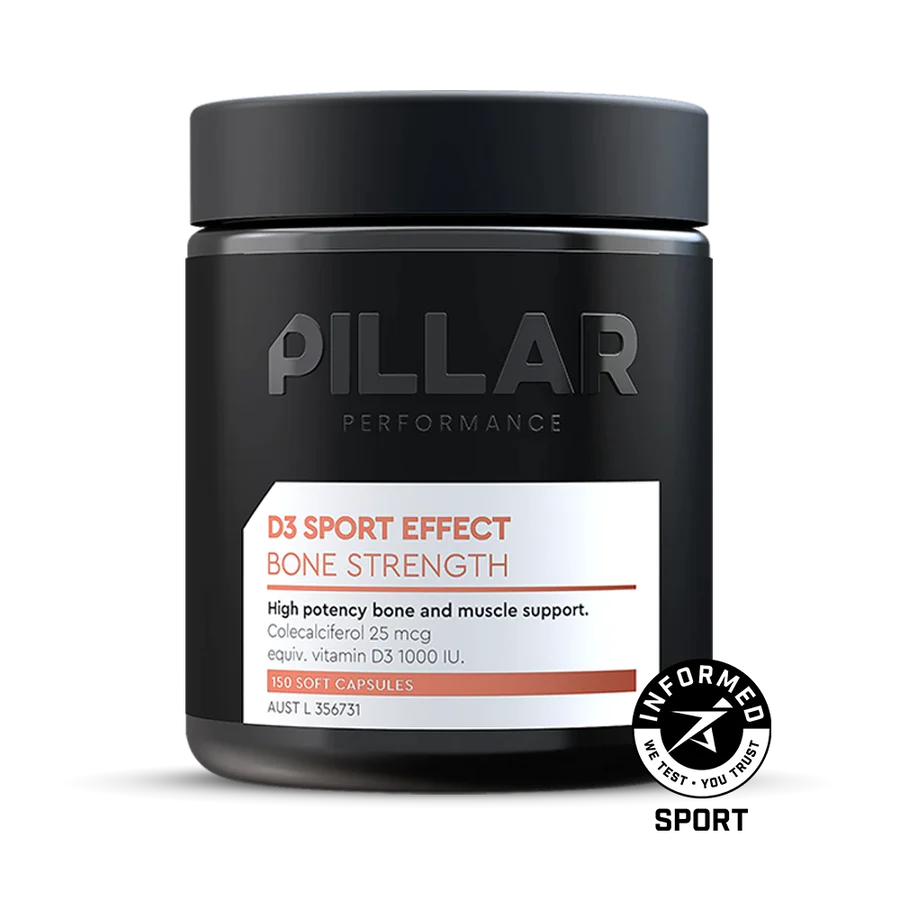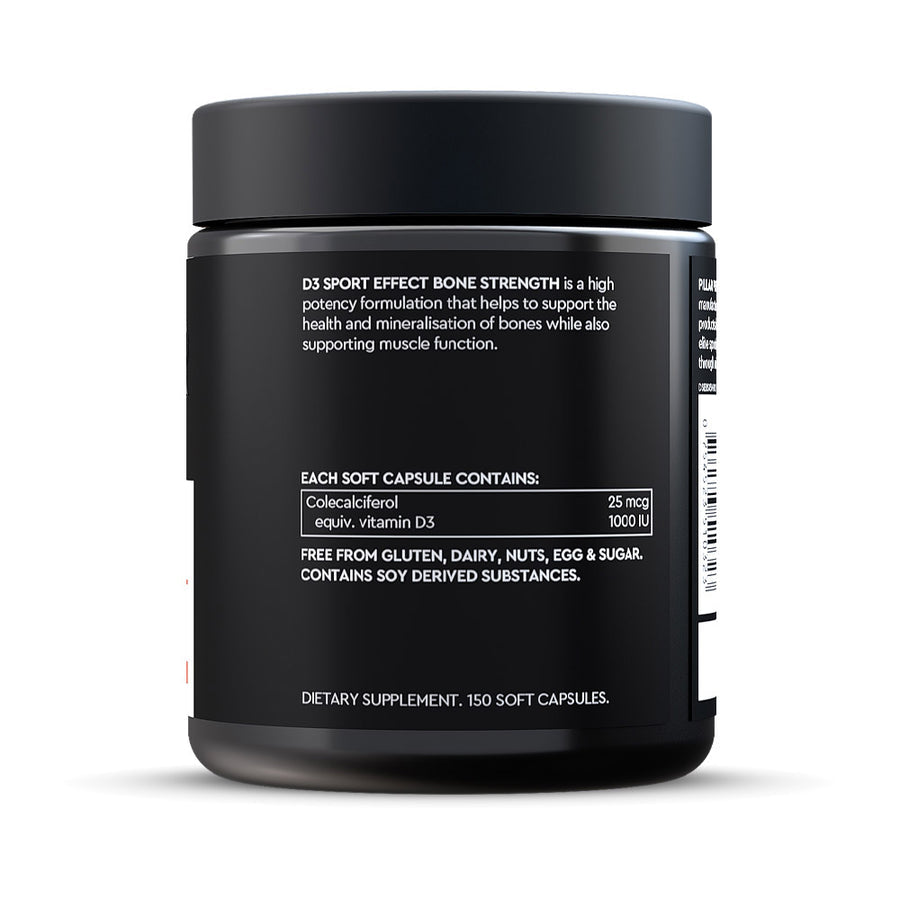Key Features
- High strength vitamin D3 1000IU per capsule.
- Supports bone health.
- Support bone mineralisation.
- Vitamin D helps calcium absorption.
- Can assist in maintaining healthy muscle function.
- 150 soft gel capsules
While we don’t exactly photosynthesise, humans too undergo a very special chemical reaction in the sun. Once the ultraviolet B radiation from the sun penetrates our skin’s epidermis, our body begins the production of vitamin D, or specifically vitamin D3.
The role vitamin D plays in our overall wellness cannot be emphasised enough, and it’s now clear that it has multiple, crucial roles in addition to its traditional known effects of mediating calcium and bone health.
To understand the role of vitamin D more richly, it’s first important to note that while it’s referred to as a ‘vitamin’, this term is actually a misnomer. Vitamin D is not a ‘true vitamin’, it is actually a hormone. Identifying vitamin D as a hormone helps to explain how it’s inextricably tethered to so many biological functions.
The role of vitamin D in supporting muscoskeletal health has now been corroborated by a plethora of data, with deficiencies linked to increased vulnerability towards muscle and bone related conditions, such as increasing the risk of osteopenia, precipitating and exacerbating osteoporosis, and increasing muscle weakness. This is because vitamin D plays a synergistic role in supporting the absorption of calcium.
While osteoporosis has previously been thought to be an ‘older’ person’s condition, deficiencies in vitamin D are common across all age groups due to risk factors such as ethnicity, age, dietary sensitivities/preferences, sun exposure and much more. Such a diverse range of risk factors make it difficult for individuals to obtain their vitamin D ‘naturally’ from the sun, and hence, supplementation plays an important role in maintaining healthy baseline levels to ensure muscles and bones are well protected.
In recent years, interest in relation to vitamin D has been growing exponentially, due to the increased prevalence of its deficiency and its subsequent association to a wide range of diseases. The importance and versatility of vitamin D is becoming increasingly evident, where it can be seen playing an active role in immune function, protein synthesis, muscle function, cardiovascular function, inflammatory response, cell growth and musculoskeletal regulation.
Vitamin D has been used (unknowingly) to treat infections, such as tuberculosis (TB), long before the advent of medications such as antibiotics. TB patients were often sent to medical facilities where treatment included exposure to sunlight, which was thought to directly ‘kill’ the infection. While the proposed mechanism of action was flawed, this practice was underpinned by traditional wisdom and an anecdotal understanding that being in the sun somehow helped improve overall health.
There have been multiple studies that have correlated low vitamin D levels with increased infection. One study of almost 20,000 subjects found that individuals with lower vitamin D levels (<30 ng/ml) were more likely to report a recent upper respiratory tract infection than those with sufficient levels (even after adjusting for variables including season, age, gender, body mass and race).[1] This also ties into our understanding of the role seasons have in our fluctuating immune susceptibility. The cold weather we experience in winter doesn’t inherently cause a surge in influenza, but rather, the shorter days, decreased sunlight exposure leads to one thing – significantly less vitamin D – a biological breeding ground for illness susceptibility.
We now understand that vitamin D modulates both the innate and adaptive immune responses, and that interestingly, vitamin D deficiency is often underlying in many autoimmune diseases. Studies have now shown that vitamin D affects T-cell (immune fighter cells) development, skewing them away from the inflammatory variety, resulting in decreased production of inflammatory cytokines (cells), and increased production of anti-inflammatory cytokines (cells). As we are becoming increasingly aware about how immune cells respond to the effects of vitamin D, ensuring healthy vitamin D levels is hugely important in the prevention of illness.
Understanding the power of vitamin D is particularly important to athletes. While supplementation is beneficial to the general population, it is especially important for athletes who are exposed to physiological stressors and circumstances above and beyond those of sedentary individuals. Regular and intense physical training may increase an athlete's need for supplementation due to the loss of key vitamins and minerals through sweat, increased weight-bearing load on bones, restrictive eating habits and/or lack of sunlight.
The deficiency of this vitamin is generally widespread in the athletic population, with an increase in morbidities associated with it. For example, a study of 214 NFL scouts (with a median age of 22) found that overall, 59% of the athletes had below-normal levels of vitamin D, defined as > 50nmol/L, placing them in an increased risk category for injury and illness. Additionally, of the study participants who missed at least one football game in the last season, 86% were found to have significantly low levels of vitamin D.
In relation to vitamin D supplementation in athletes with deficiency, several studies have shown that not only does vitamin D play a preventative role in respiratory illnesses, but higher serum levels led to increased muscle strength, reduced injury rates, and led to overall better sports performance.
It’s important to correctly identify people with vitamin D deficiency who require supplementation to help optimise their performance and prevent future illness/injuries. To keep you and your immune system functioning at their best, ensure you are supplementing adequate levels of vitamin D to support you at every stage of your training regimen.





